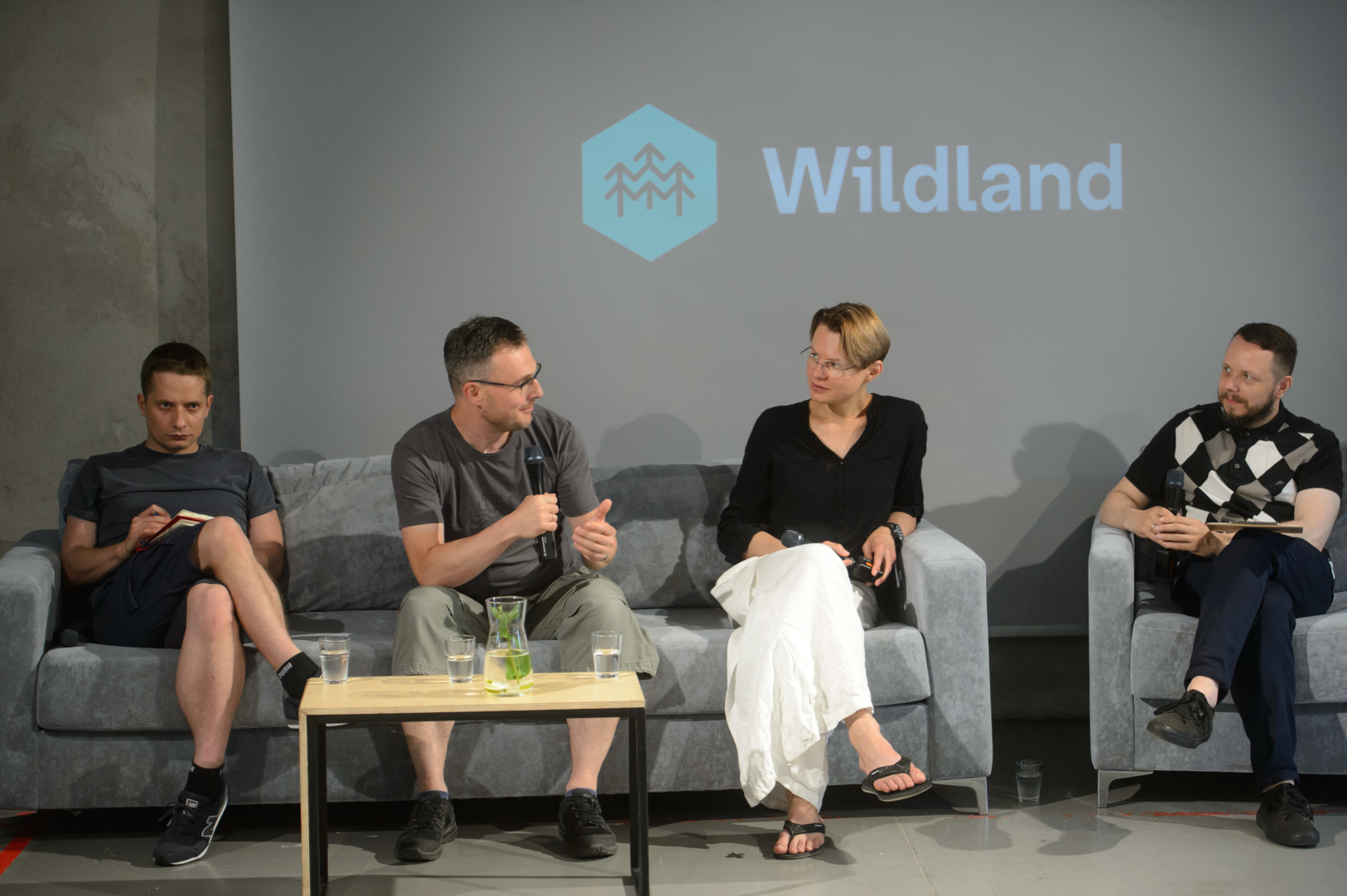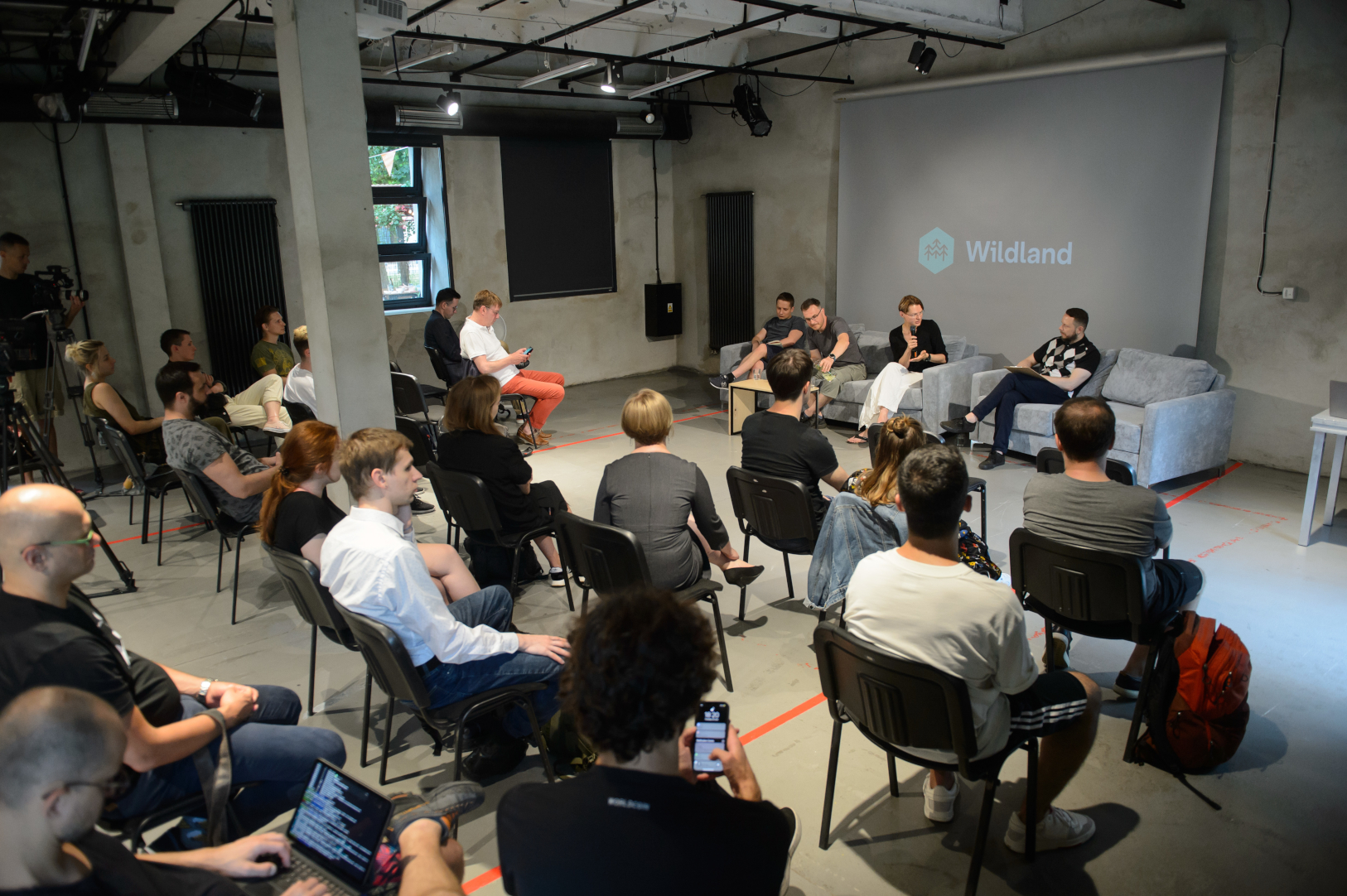Wildland 0.1 Release Meetup - As it happened
On the 24th of June, despite some pretty wild weather with a thunderstorm hanging in the air, around 30 people gathered at Nowy Teatr in Warsaw for Wildland’s 0.1 Release Meetup.
The event gave an opportunity to celebrate the release of the client- the first implementation of the Wildland protocol - a highly ambitious project running under the strapline of Freedom for your data. Equally so, the gathering was a chance to dig deeper into Wildland’s core concepts and its future, thanks to a live demo ran by Michał Kluczek and Joanna Rutkowska, as well as a Q&A session with the team leaders: Joanna, Andrzej Regulski and Julian Zawistowski. For the participants it also facilitated a real-life space for discussion and bouncing ideas off each other, which seemed to prove especially fruitful and was a very welcome change after months of pandemic-induced isolation and countless online events.

The full recorded Q&A session will be available soon for anyone interested to watch. In the meantime (or perhaps if you’re pressed for time or prefer reading over listening/watching) here is a concise summary of what Joanna, Julian and Andrzej had to say about what Wildland is, where it’s at currently, and what its future holds.
The big picture
Wildland is a big, ambitious project - it’s a response to the growing frustration and dissatisfaction with the way data storage works, as it’s based on a service-oriented paradigm. That, in itself, is a very complex problem: centralizing things is convenient and people have a tendency to be lazy; secondly, there is a conflict of interest between those who create the solutions we use and the users’ interests, which is inherently difficult to balance out. As Julian stated during the Q&A, Wildland is not a tool for solving all the problems connected to dependency on online service providers and losing control over our data, but it certainly aims to shift the paradigm to favoring data over services.
Wildland can be described in many ways, depending on the chosen perspective. As Joanna explains using the popular example of a storage solution like Dropbox, Wildland is in many ways similar, but “instead of one vertically integrated infrastructure, you have control over any kind of infrastructure you want to use through Wildland”. What also sets it apart from other cloud storage solutions is that it allows the user to decouple themselves from storage providers. Wildland frees users from dependency on online services, makes migration between different storage options seamless, and lets users interact with their data with the tools of their choice.

You can also think of it, in the broader sense, as a knowledge management tool. As Julian points out while discussing possible use cases, Wildland is “a kind of file system Internet - you can go down the road to all the possible resources people have shared with you. You can get that and build on it - you can then imagine Wildland as a backend for apps, organizing knowledge way beyond your personal notes”.
What Julian believes Wildland can do, is it can “help by creating a layer, where the user can have a much higher chance of keeping control of their data and of having it available all the time, than without the use of Wildland”. What Wildland’s creators want to do through tackling these problems, is to improve the interaction with data and further down the road, create a user-friendly and user-controlled ecosystem.
And why is keeping your data under your control so important anyway? As Joanna puts it, “If you are a reductionist and believe that you are essentially a thread of information, it’s easy to understand that information is really what matters”. Data is important as a carrier and storage for information. That’s why we need reliable tools and infrastructure for securing the information which is essential to us. Wildland is a tool which makes it easier for every individual to decide how the information which is important to them is secured.
The current state of Wildland
The release of the first client is a great opportunity to pinpoint where Wildland currently is. While the current implementation of the protocol is aimed mainly at three groups, identified by Andrzej as potential hires (as scaling up the team is one of the current priorities), developers as well as early adopters, most can appreciate the exciting novel features which it already has.
Joanna singles out three highlights: first of all, it’s the fact that you can connect multiple storage backends (S3 buckets, WebDAV servers, Dropbox accounts, etc) and expose them all as one unified file system thanks to backend agnosticism. Secondly, it’s multicatigorization, which is essential in making file systems a knowledge management tool. And thirdly, it’s cascading addressing, which means building complex directories, getting around censorship, and “essentially building alternative Internets without having to care about a single root of trust”.

What sets Wildland apart from other projects aiming at securing data availability, is that Wildland takes storage and upgrades it to a knowledge management tool, while most other projects take storage and simply make it more decentralized. Wildland is also free from what Joanna describes as P2P fetishism, where the reliability of a solution is based on its numbers, ex. the number of nodes it has. Wildland brings the concept of pragmatic decentralization to the table. Joanna: “What we believe we do in a non-standard way is we are more pragmatic. We don’t tell the user: ditch any kind of data centers you use and only use a P2P network. We say: use anything you want.”
The future for Wildland
In the short term, the team aims to improve Wildland in three key areas: make it easier to use (software, UX, adding the Ethereum-based marketplace), make it faster as well as more universal. While currently Wildland is being developed mostly in-house Andrzej explains, the vision entails building an entire ecosystem of contributors. The team hopes to facilitate this collaborative effort through a grant program with two main areas of funding: the first is Wildland specific (like building plugins) and the second is enhancing the role of the native Golem token GLM through exploring the concept of UDO - User Defined Organization.
UDO, an idea developed by Golem Foundation, aims to tackle the problem of low participation in the governance of decentralized spaces. As Julian explains, people aren’t interested in governance. Another problem is that when governance is organized around ownership of a speculative token, we always have a misalignment of interest between the owners of the tokens and the actual users. This simply replicates the classic model of a corporate owner who wants to deliver a model of service which is most lucrative financially, and not the best solution for the users. UDO aims to bind governance with usage by having a metric of usage and translating it into voting power, without the option of transferring that power onto someone else. How will this happen? Julian:“Every time you’ll spend some funds in Wildland’s marketplace, a fraction of those funds will be converted into GLM and burnt to create a non-tradable Proof of Usage (PoU) token. These tokens will be awarded to the person who had initialized the transfer and will give her voting rights in a governance layer of Wildland”.

What does the team see when looking into the more distant future? They all agree they want to see Wildland evolve and grow into something which grants more assurance of data availability. Joanna: “I want to be able to take any device and see my digital data as a navigable graph, zoom into an area of interest, see my files there, move the containers within categories. Essentially, for me, the end goal is a tool that gives me the power to visualise and organize my digital life.” Andrzej: “We envision the development as building an entire ecosystem of organizations, teams and individuals who contribute to Wildland”. Julian: “I think this is a pretty bold experiment: both in terms of technology, as well economy and governance. In the dream scenario we are successful on all those levels.”
The summary doesn’t go into detail when describing Wildland’s core features, but if you’re interested and would like to read a more in depth explanation, head over to the W2H paper or the extensive documentation which was released along with the client.
For the latest on Wildland or if you feel like contacting the team, follow us on Twitter @WildlandIO.